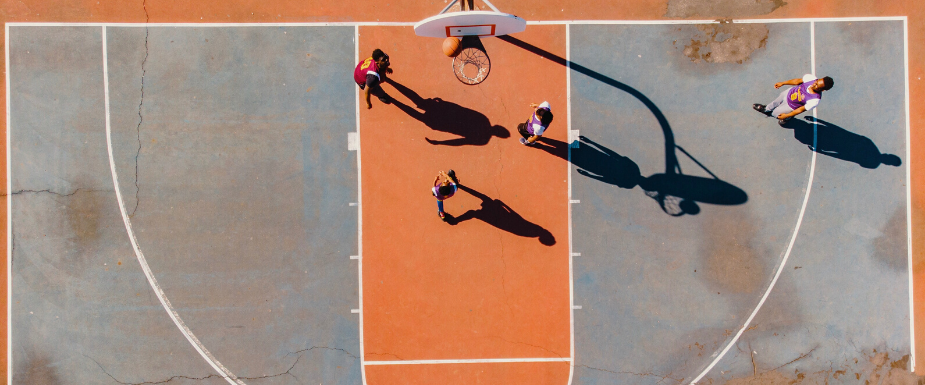Saints and Sinners and Sufferers on a Basketball Court

I was young and eager to help, and foolish.
I signed up to join a small team of Christian men to serve at a men’s shelter in the Bronx because I thought that I could offer something. It was the early 1990s and my twenty-something heart hungered to care for guys who had a difficult life, had struggled with addiction, or been to jail.
So when our group walked to the shelter from the subway, I anticipated conversations where I would offer my caring encouragement, teach these guys about the Bible, help them get on with their life. Wow, I was wrong.
We spent the afternoon playing basketball, eating bologna sandwiches at a picnic table, and swapping stories. Mostly, I spent an afternoon being reshaped by guys twice my age and five times my life-experience. Their faith was far more real than anything I had experienced.
I don’t know if they pitied my pathetic attempts at paternalism or were offended by it, but they showed me more kindness than I deserved.
I learned something important that day that has stuck with me for the past three decades. It has shaped the way that I view ministry and relate to people. I could not have said it clearly back then, but I felt it in a visceral way.
All of us are sinners and sufferers. All of us.
My foolish heart acted as if I was better than these men somehow, but God taught me his grace and wisdom through those guys on the basketball court.
Paul writes in Romans 7:18-19 (NIV), “For I know that good itself does not dwell in me, that is, in my sinful nature. For I have the desire to do what is good, but I cannot carry it out. For I do not do the good I want to do, but the evil I do not want to do—this I keep on doing.”
My loftiest goals are not enough to sustain righteous living. Even when I desire to do good, Paul writes, I mix those desires with actions of selfishness, or pride, or judgement, or independence, or idolatry, or neglect. The deeper that Paul understands the gospel, the deeper he sees his own evil at work. We live in a world swirling with brokenness and evil. That ongoing brokenness not only affects us in forms of suffering, but we also contribute to it with our own sinful thoughts, words, and deeds.
And the better part of Paul’s gospel message is that all Christians are also saints. He continues, in 7:25-8:1, “Thanks be to God, who delivers me through Jesus Christ our Lord!... Therefore, there is now no condemnation for those who are in Christ Jesus.” The impossibly wretched man is now free. Not condemned, but fully redeemed. Agents of the new world. Set apart for his glory.
Those basketball saints showed me their redeemed beauty, hidden from the world that had declared them less successful (cf 1 Corinthians 1:26-31). I was helped by those men far more than I helped them.
Saints still suffer and sin, and so we move in the world with humility and hope. I was humbled then, and still am humbled as I sit in hospital rooms or subways or sidewalks. Who am I to receive God’s grace? My twenty-something self acted as if I was somehow better, but the gospel tells me that we all are poor in spirit.
Now, whenever I sign up to help a Hope for New York affiliate, I think about the lessons that God has for me to learn as I share His love with people that He already loves.
Andrew (Drew) Field is the Executive Pastor of Redeemer West Side.
